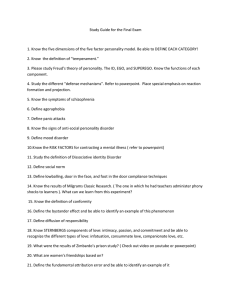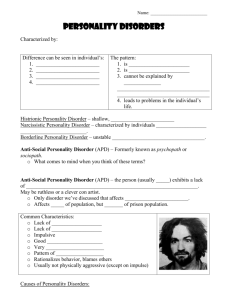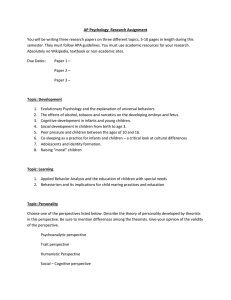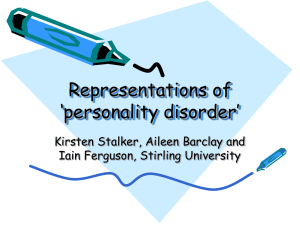Personality Disorders Assignment: Symptoms, Causes, Treatment
advertisement
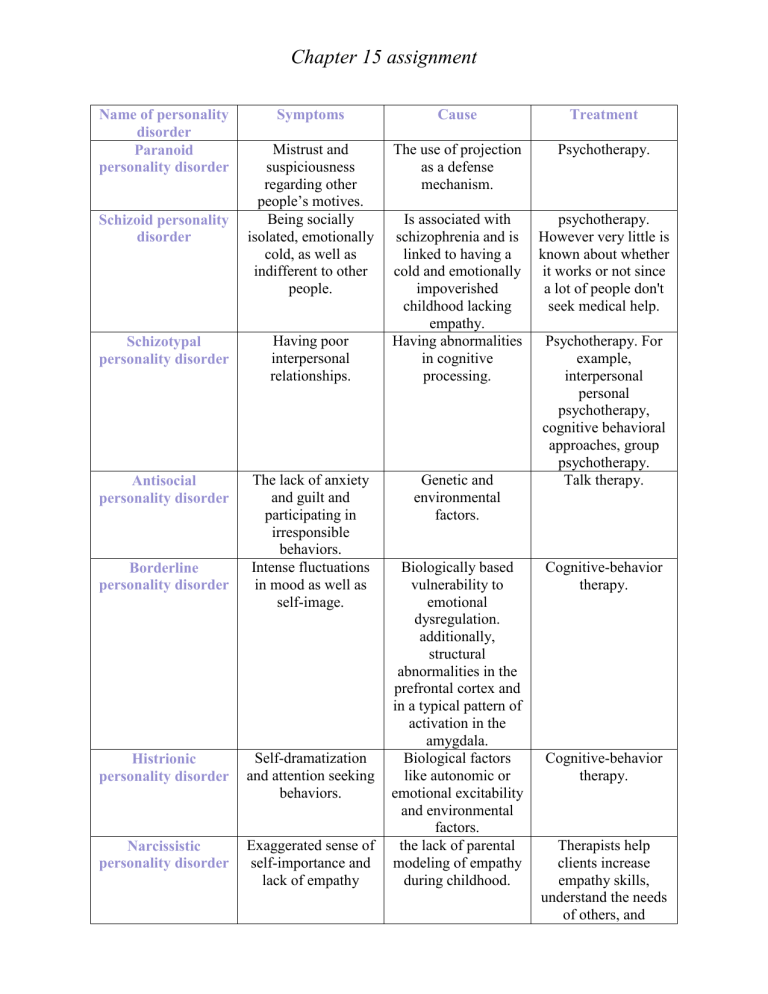
Chapter 15 assignment Name of personality disorder Paranoid personality disorder Schizoid personality disorder Symptoms Cause Treatment Mistrust and suspiciousness regarding other people’s motives. Being socially isolated, emotionally cold, as well as indifferent to other people. The use of projection as a defense mechanism. Psychotherapy. Is associated with schizophrenia and is linked to having a cold and emotionally impoverished childhood lacking empathy. Having abnormalities in cognitive processing. psychotherapy. However very little is known about whether it works or not since a lot of people don't seek medical help. Schizotypal personality disorder Having poor interpersonal relationships. Antisocial personality disorder The lack of anxiety and guilt and participating in irresponsible behaviors. Intense fluctuations in mood as well as self-image. Borderline personality disorder Histrionic personality disorder Self-dramatization and attention seeking behaviors. Narcissistic personality disorder Exaggerated sense of self-importance and lack of empathy Genetic and environmental factors. Biologically based vulnerability to emotional dysregulation. additionally, structural abnormalities in the prefrontal cortex and in a typical pattern of activation in the amygdala. Biological factors like autonomic or emotional excitability and environmental factors. the lack of parental modeling of empathy during childhood. Psychotherapy. For example, interpersonal personal psychotherapy, cognitive behavioral approaches, group psychotherapy. Talk therapy. Cognitive-behavior therapy. Cognitive-behavior therapy. Therapists help clients increase empathy skills, understand the needs of others, and Chapter 15 assignment Avoidant personality disorder Persuasive social inhabitation and fear of rejection. Dependent personality disorder Excessive dependence on others and being submissive Controlling interpersonal behaviors and perfectionism. Obsessivecompulsive personality disorder - complex interaction between early childhood environmental experience and innate temperament. For instance, parental rejection. Maternal deprivation. Genetic or early childhood environmental factors. decrease selfinvolvement. Cognitive behavioral, psychodynamic, interpersonal, and pharmacological treatments. Group and individual group treatments. Cognitive behavioral therapy and supportive forms of psychotherapy. Pick one Personality Disorder that is similar to a mental disorder that we studied in class and create a second chart listing the differences. Obsessive-compulsive personality disorder (OCDP) A personality disorder Rigidity in personality present Need for control present Perfectionism present Indecisiveness present The need to perform rituals not usually present Intrusive thoughts and behaviors not usually present Orderliness present Obsessive-compulsive disorder (OCD) A mental disorder Not rigidity in personality Need for control not usually present Perfectionism not usually present Indecisiveness not usually present The need to perform rituals present Intrusive thoughts and behaviors present Orderliness not usually present
